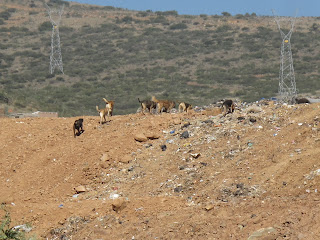This week I made it to the rubbish dump in search of plastic recycling. To get there Sarah (thanks to her knowledge of truffi’s) escorted me to the right neighbourhood. Well, her and the help of the person next to me on the truffi. The older Cochabambino gave me great directions and instructed the truffi driver on where to drop me off. For this I was thankful because getting to the dump did not end up being as straight forward as I would have liked. I had to hunt for a bridge to cross the river and speak with a local woman who was not convinced I really wanted to know where K’ara K’ara was. In the end this trip was experiential rather than educational in the pedagogic sense. It blended two disparate beasts: adventure and the confronting reality of poverty.

After crossing the small bridge (stolen from The Temple of Doom archives) I wandered up a peaceful hill on a winding dirt road toward (I assumed) the dump. Despite the depressed nature of the neighbourhood there was a calm here that was surprisingly comforting. Comforting until I made it half way up the hill. As I came to the fourth bend I could hear dogs barking. When I appeared around the corner a group of dogs on my right raced toward me barking and bearing their teeth while another group barked and circled to my left. When I walked on they all slowed but continued to aggress. This was the cue to shit my pants. My pace began to halt and then a lady emerged from doing her washing. The lead dog of the left pack turned its head toward her with doe-eyes. Then stopped barking. All the dogs on the left quietened and I was able to pass while the dogs on the right continued the vocal assault.
After the dogs I hardly minded the irritated expression the lady at the top of the hill gave me when I asked for directions. Unfortunately for me the dump ended being visible from where we were both standing. As I approached there was little smell coming from the dump. They must be doing something right. At the fence line I found a sign that says there is a 1000 Boliviano fine for trespassing. I would not be seeing the giant mound of rubbish up close today. Despite this, serendipitously, there were numerous pens (where I had arrived) filled with plastics. I walked about looking at the muddled structures that were strangely organized in terms of plastic categorization. In walkway amongst the pens I spoke to my third lady for the morning who could not understand a word I was saying. I can only deduce that she only spoke Quechau (a really possibility; not sarcasm about my ability to speak Spanish). Five minutes later a man and a lady were just as much help though they did speak Spanish. They suggested to me that plastics do not go anywhere. Groan, surely not, then why are ordered like this?


When I started to take a few photos the breeze shifted and I was molested by the smell of the dump. When I looked toward the tip I could see more dogs roaming about. I counted at least ten per pack but only managed to photo seven together at one time. I got bashful about taking photos quickly and decided to leave. As I walked away I noticed how much debris was scattered beyond the fence line. Worse than that was the shacks erected amongst the mess. To my right I saw three children laughing and playing (throwing rocks at each other) in amongst it all. They sounded happy. Before leaving I spoke to one of the boys playing - in a final attempt - to get information about the recycling. Though he couldn’t help me he did shock me worse than the dogs: he was such a nice kid, totally sweet. His input to the morning left me more unsettled than anything else. Thinking of his face I cannot help wonder what he has to do with recycling; the purpose of my trip.

As I returned to the main road I encountered my sixth lady for the morning and exchanged a warm “buen dia.” She then asked me where I came from. To say she presented as shocked would be a gross overstatement. I let her know I had come from the dump (el botadero) which was returned with a mild questioning stare. I will say this, all the people living around here are cordial (dogs excluded in this value-judgement). I gave her a wave and a hasty “caio-caio.” I should have stayed and practiced my Spanish. She wanted to chat.
So where do plastics go in Cochabamba? This I cannot answer as conclusively as I would like. I can say with some certainty that many of them get piled up in pens next to a shack that houses a ten year old boy and his family. The boy has a dirty face and his demeanour is friendly. His shack is next to a big steaming pile of refuse. I am not sure I expected to see a plastic chipper or a revolutionary recycling programme when I made this trip. Having said this I did not expect to be brought so close to the massive challenges facing a developing country. Out in the K’ara K’ara rubbish dump you can get in touch with all manner of need: educational, health, environmental, waste management, town planning, basic infrastructure (power, water), parenting, employment, animal welfare... on and on the list could go. Wondering where plastics go has led me to the sharp end of poverty in Cochabamba and thus a new set of questions. I am sure I do not need to enumerate them for you.



No comments:
Post a Comment